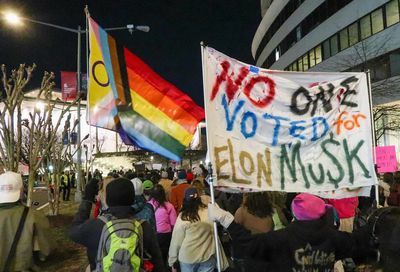Student alleges school’s pro-transgender locker room policy constitutes “sexual harassment”
Lawsuit out of eastern Pennsylvania is almost a mirror image of Pine-Richland case out of western Pennsylvania

A high school student in Pennsylvania and his parents are suing their local school district over its transgender-friendly policy, alleging that having to share facilities with transgender students constitutes “sexual harassment.”
The student, known as “Joel Doe” is suing the Boyertown Area School District, located in the Philadelphia exurbs of Berks County, claiming the policy violates his right to bodily privacy under the U.S. Constitution, constitutes sexual harassment under Title IX, and flies in the face of a state privacy law requiring separate facilities for students of different biological sexes.
The Doe family has enlisted the help of the anti-LGBTQ Alliance Defending Freedom and the Independence Law Center, a pro bono legal organization affiliated with the Pennsylvania Family Institute. The crux of their argument in their lawsuit, filed in U.S. District Court for the Eastern District of Pennsylvania, is that “sex is fixed at conception, binary, objectively verifiable, and rooted in our human reproductive nature.”
Therefore, Doe’s legal team argues, by opening locker rooms and other facilities up to transgender people based on their gender identity, Boyertown Area School District is “violating sex discrimination law by not protecting students based on sex, but instead imposing an individual’s subjective perception of their gender on other students who value their privacy based on anatomical differences between the sexes.”
According to the complaint filed in the lawsuit, Joel Doe was in the boys’ locker room, changing for gym class, when he noticed a student whom he perceived as female, in underwear and a bra. When he complained to school officials, they informed him that the district’s policy allowing transgender students to use facilities consistent with their gender identity. When he asked school officials what they could do to protect his privacy, he was told he must “tolerate” sharing facilities with transgender students and make it as “natural” as he can.
When he and his parents objected to the school’s solution, he was offered the chance to use the bathroom in the nurse’s office to change. Ironically, what Doe and his parents are protesting — his being relegated to the nurse’s office rather than the locker room of the gender with which he identifies — is typically the prescription given for transgender students in other school districts where the restroom and locker room policy is based on biological sex alone.
Does lawyers say he “has experienced embarrassment and humiliation” from viewing and potentially being viewed by a student of the opposite sex in a state of undress, as well as from “stigmatization and criticism” he received from other students and adults because of his discomfort. They also claim Doe now avoids using the restroom during the school day “because of the ongoing risk of having his privacy violated.”
“Our laws and customs have long recognized that we shouldn’t have to undress in front of persons of the opposite sex,” Alliance Defending Freedom Legal Counsel Kellie Fiedorek said in a statement. “But now some schools are forcing our children into giving up their privacy rights even though, in this case, Pennsylvania law requires schools to have separate facilities on the basis of sex.”
But Eliza Byard, the executive director of GLSEN, told the Associated Press that administrators could have resolved the situation by making special arrangements allowing Joel Doe to use single-occupancy or staff bathrooms and locker rooms if he felt uncomfortable around a transgender student.
“The existence of a transgender person living their life appropriately at school cannot constitute sexual harassment,” Byard told the AP. “It might make another student uncomfortable and in that case, there is a common sense legal remedy of providing separate accommodations to the student who feels uncomfortable.”
In many ways, Doe v. Boyertown Area School District is the mirror image of Evancho v. Pine-Richland School District, a case out of the Pittsburgh area in which three transgender students have sued to be allowed to use the facilities that match their gender identity in a school district whose policy is hostile to transgender students. In both cases, students claim that their rights are being violated under both Title IX and the U.S. Constitution — in Doe’s case, by allowing trans students to use facilities matching their gender identity, and in the Pine-Richland case, by prohibiting them from doing so.
Last month, U.S. District Judge Mark Hornak, of the Western District of Pennsylvania, issued an injunction to stop Pine-Richland school district from blocking the transgender students from using restrooms matching their gender identities. While Hornak did not feel the policy violated the students’ Title IX rights, he did find that the policy violated their civil rights under the Equal Protection Clause of the Fourteenth Amendment to the U.S. Constitution.
Omar Gonzalez-Pagan, a staff attorney with Lambda Legal, says that the very arguments now being used by the plaintiffs in the Boyertown case were used, unsuccessfully, by the defendants in the Pine-Richland case.
“To the extent that any student in any school feels uncomfortable in the presence of others, those privacy concerns can be accommodated for that student,” Gonzalez-Pagan says. “However, the law is clear and the Constitution is clear: private biases and discomfort cannot be used to justify discrimination, and those arguments were rejected by the court in the Pine-Richland case.”
Gonzalez-Pagan also says the Doe lawsuit against Boyertown is an effort by conservative legal groups to halt the growing number of school districts within Pennsylvania that are adopting pro-transgender policies, particularly in the wake of the court’s injunction in Evancho.
“This is an effort to chill the growing trend of schools in Pennsylvania, like in Boyertown, that are adopting policies because of the law and because it’s the right thing,” he says. “This is a case that has no merit, and we’ll see that result quickly.”
Support Metro Weekly’s Journalism
These are challenging times for news organizations. And yet it’s crucial we stay active and provide vital resources and information to both our local readers and the world. So won’t you please take a moment and consider supporting Metro Weekly with a membership? For as little as $5 a month, you can help ensure Metro Weekly magazine and MetroWeekly.com remain free, viable resources as we provide the best, most diverse, culturally-resonant LGBTQ coverage in both the D.C. region and around the world. Memberships come with exclusive perks and discounts, your own personal digital delivery of each week’s magazine (and an archive), access to our Member's Lounge when it launches this fall, and exclusive members-only items like Metro Weekly Membership Mugs and Tote Bags! Check out all our membership levels here and please join us today!

























You must be logged in to post a comment.